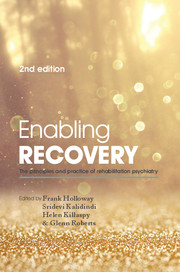Book contents
- Frontmatter
- Contents
- List of contributors
- List of figures, tables and boxes
- Preface
- Part 1 Setting the scene
- Part 2 Treatment approaches
- Part 3 Key elements of a rehabilitation service
- Part 4 Special topics in psychiatric rehabilitation
- 23 Special topics in psychiatric rehabilitation: overview
- 24 Rehabilitation and acquired brain injury
- 25 Autism spectrum disorder
- 26 Risk management in rehabilitation practice
- 27 Rehabilitation: an international perspective
- 28 Psychosocial rehabilitation across culture: the experience in low- and middle-income countries
- 29 Expanding the evidence base
- Part 5 Future directions
- Index
27 - Rehabilitation: an international perspective
from Part 4 - Special topics in psychiatric rehabilitation
Published online by Cambridge University Press: 02 January 2018
- Frontmatter
- Contents
- List of contributors
- List of figures, tables and boxes
- Preface
- Part 1 Setting the scene
- Part 2 Treatment approaches
- Part 3 Key elements of a rehabilitation service
- Part 4 Special topics in psychiatric rehabilitation
- 23 Special topics in psychiatric rehabilitation: overview
- 24 Rehabilitation and acquired brain injury
- 25 Autism spectrum disorder
- 26 Risk management in rehabilitation practice
- 27 Rehabilitation: an international perspective
- 28 Psychosocial rehabilitation across culture: the experience in low- and middle-income countries
- 29 Expanding the evidence base
- Part 5 Future directions
- Index
Summary
Introduction
Psychiatric rehabilitation has global relevance (Rossler, 2006). Our aim in this chapter is to offer an account of key trends in policy and practice internationally. Providing a brief but accurate account of the literature is fraught with difficulty. The day-to-day working of mental health services is dependent on a host of country-specific factors relating to the funding and organisation of health and social care, mental health legislation and policy, and the social and cultural context. (The significance of culture is discussed in detail in Chapter 28, ‘Psychosocial rehabilitation across culture’, which focuses on rehabilitation in low- and middle-income countries.) The lack of reliable data makes comparison between countries very difficult, as does the enormous disparity in the resources available to mental health services, even within a generally wealthy region such as Europe (Muijen, 2008; World Health Organization Mental Health Europe, 2008).
Much of what is written about rehabilitation and recovery, particularly at the policy level, comes across as rather abstract – full of positive sentiments but short on practicalities. To counteract this we provide some comparative data on key components of rehabilitative mental healthcare and end with a description of a large-scale service change in New York State that two of us (LIS and ME) have been involved in.
Core concepts in rehabilitation and recovery
There is a general consensus that psychiatric or psychosocial rehabilitation has as its goal helping people experiencing persistent and severe mental illness to live good lives as independently as possible (Rossler, 2006). In the past, rehabilitation was often seen as a stand-alone process offering selected technical interventions to people, either living within the traditional mental hospital or in the community, who were ‘rehabilitation ready’. A more contemporary understanding sees rehabilitation as embedded within the fabric of health and social care services that work with the individual, his or her social network and the wider social context, with an overarching aim of promoting social inclusion (Barbato, 2006). Rehabilitation and recovery are, in this sense, the business of all mental healthcare, although in practice specific rehabilitation services tend to become involved when the patient's journey to social inclusion has become stuck.
- Type
- Chapter
- Information
- Enabling Recovery , pp. 409 - 424Publisher: Royal College of PsychiatristsPrint publication year: 2015



